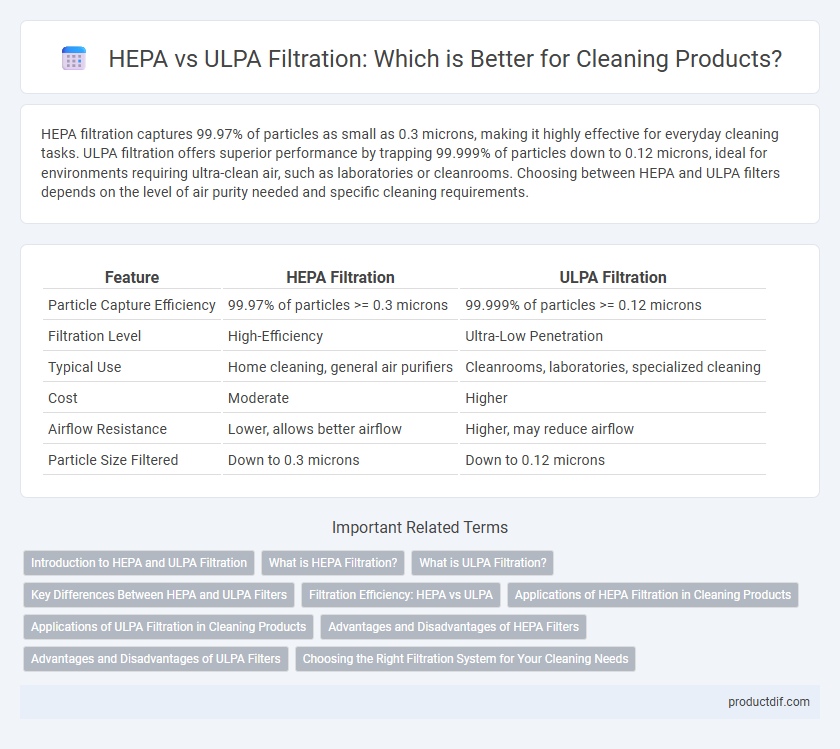HEPA filtration captures 99.97% of particles as small as 0.3 microns, making it highly effective for everyday cleaning tasks. ULPA filtration offers superior performance by trapping 99.999% of particles down to 0.12 microns, ideal for environments requiring ultra-clean air, such as laboratories or cleanrooms. Choosing between HEPA and ULPA filters depends on the level of air purity needed and specific cleaning requirements.
Table of Comparison
| Feature | HEPA Filtration | ULPA Filtration |
|---|---|---|
| Particle Capture Efficiency | 99.97% of particles >= 0.3 microns | 99.999% of particles >= 0.12 microns |
| Filtration Level | High-Efficiency | Ultra-Low Penetration |
| Typical Use | Home cleaning, general air purifiers | Cleanrooms, laboratories, specialized cleaning |
| Cost | Moderate | Higher |
| Airflow Resistance | Lower, allows better airflow | Higher, may reduce airflow |
| Particle Size Filtered | Down to 0.3 microns | Down to 0.12 microns |
Introduction to HEPA and ULPA Filtration
HEPA filtration captures at least 99.97% of airborne particles as small as 0.3 microns, making it highly effective for removing dust, pollen, and pet dander in cleaning applications. ULPA filtration offers even higher efficiency, trapping 99.999% of particles down to 0.12 microns, which is critical for environments requiring ultra-clean air quality, such as laboratories and cleanrooms. Both filtration technologies play essential roles in improving indoor air quality by reducing microscopic contaminants during cleaning processes.
What is HEPA Filtration?
HEPA filtration captures 99.97% of airborne particles as small as 0.3 microns, effectively removing dust, pollen, mold spores, and bacteria from the air. It is widely used in vacuum cleaners and air purifiers to improve indoor air quality and reduce allergens. HEPA filters are certified to meet stringent standards, ensuring high efficiency in particle removal for cleaner and healthier environments.
What is ULPA Filtration?
ULPA (Ultra Low Penetration Air) filtration captures 99.999% of particles as small as 0.12 microns, offering superior air purification compared to HEPA filters, which capture 99.97% of particles down to 0.3 microns. ULPA filters are essential in environments requiring stringent contamination control, such as cleanrooms and medical facilities. Their advanced filtration efficiency ensures the removal of ultra-fine dust, allergens, and airborne pathogens, making ULPA filtration ideal for high-performance cleaning products.
Key Differences Between HEPA and ULPA Filters
HEPA filters capture at least 99.97% of particles as small as 0.3 microns, while ULPA filters achieve an even higher efficiency, trapping 99.999% of particles down to 0.12 microns. ULPA filters are ideal for environments requiring ultra-clean air, such as laboratories and cleanrooms, whereas HEPA filters are commonly used in residential and commercial cleaning products. The key difference lies in their filtration efficiency and particle size retention, with ULPA providing superior performance for critical applications.
Filtration Efficiency: HEPA vs ULPA
HEPA filtration captures at least 99.97% of particles as small as 0.3 microns, effectively removing dust, pollen, and mold spores. ULPA filtration surpasses HEPA by filtering 99.999% of particles down to 0.12 microns, providing superior removal of ultrafine particles and allergens. The enhanced filtration efficiency of ULPA makes it ideal for environments requiring the highest air purity, such as cleanrooms and medical facilities.
Applications of HEPA Filtration in Cleaning Products
HEPA filtration is widely used in vacuum cleaners and air purifiers to efficiently trap particles as small as 0.3 microns, making it ideal for removing dust, allergens, and pet dander in residential and commercial cleaning environments. Its high particle retention rate ensures improved indoor air quality, crucial for allergy sufferers and healthcare settings. HEPA filters balance effective filtration with airflow, maintaining powerful suction while extending the lifespan of cleaning devices.
Applications of ULPA Filtration in Cleaning Products
ULPA filtration provides superior particle removal efficiency, capturing 99.999% of particles as small as 0.12 microns, making it ideal for critical cleaning applications in pharmaceutical manufacturing and semiconductor production. Cleaning products equipped with ULPA filters effectively reduce airborne contamination, ensuring sterile environments in cleanrooms and hospitals. These filters are essential in high-precision industries where ultra-fine particle control is necessary to maintain product integrity and safety.
Advantages and Disadvantages of HEPA Filters
HEPA filters capture 99.97% of particles as small as 0.3 microns, making them highly effective for improving indoor air quality by removing dust, pollen, and pet dander. Their main advantage lies in balancing filtration efficiency with airflow, resulting in lower energy consumption and longer filter life compared to ULPA filters, which can strain equipment due to denser filter media. However, HEPA filters are less efficient at trapping ultrafine particles below 0.3 microns, limiting their performance in environments requiring near-total particle removal like cleanrooms.
Advantages and Disadvantages of ULPA Filters
ULPA filters offer superior filtration efficiency by capturing 99.999% of particles as small as 0.12 microns, making them ideal for environments requiring extreme cleanliness such as cleanrooms and laboratories. Their main disadvantage is the higher airflow resistance, which can reduce vacuum suction power and increase energy consumption. Cost is also a factor, as ULPA filters are generally more expensive to purchase and replace than HEPA filters.
Choosing the Right Filtration System for Your Cleaning Needs
HEPA filtration captures 99.97% of particles as small as 0.3 microns, making it ideal for general household cleaning and allergy reduction. ULPA filtration removes 99.999% of particles down to 0.12 microns, providing superior air purification for industrial or medical environments requiring extreme cleanliness. Selecting between HEPA and ULPA depends on your specific contamination level and air quality needs to ensure optimal filtration performance.
HEPA filtration vs ULPA filtration Infographic

 productdif.com
productdif.com